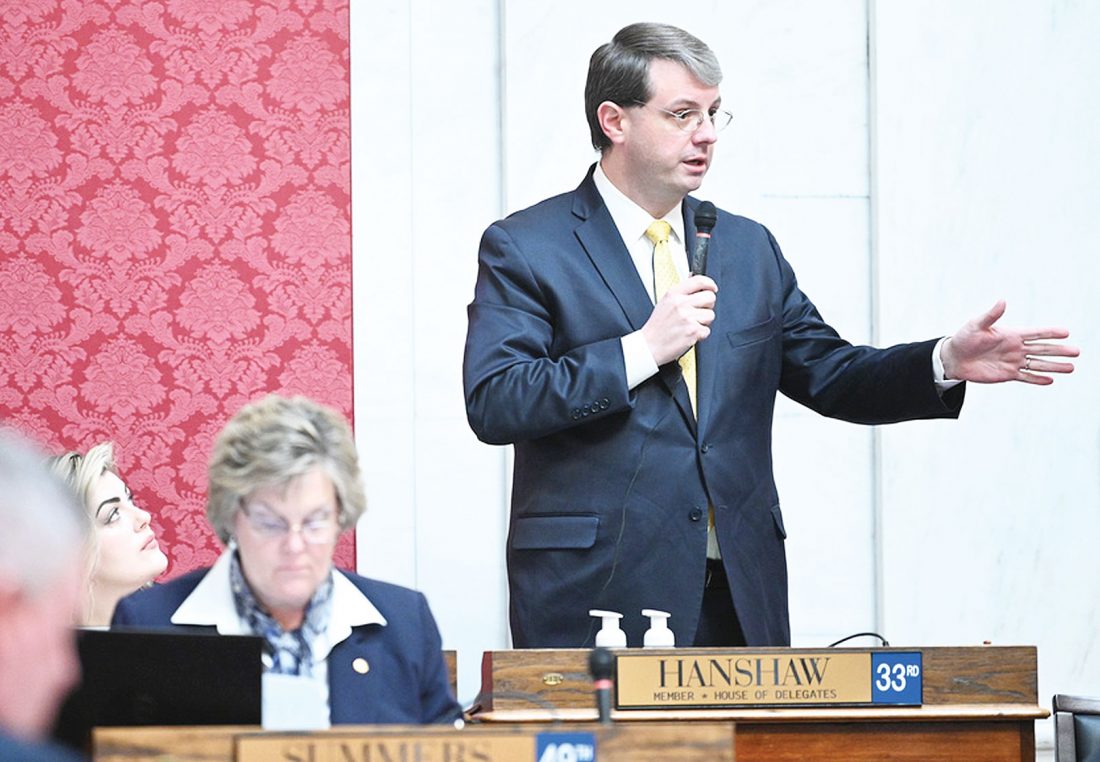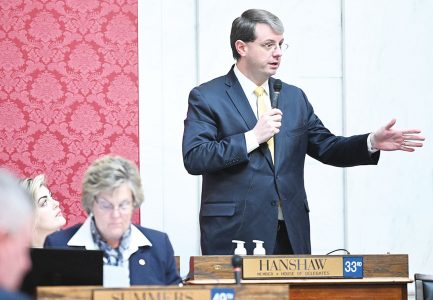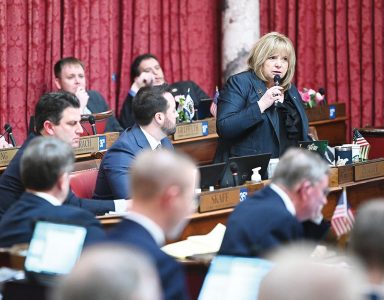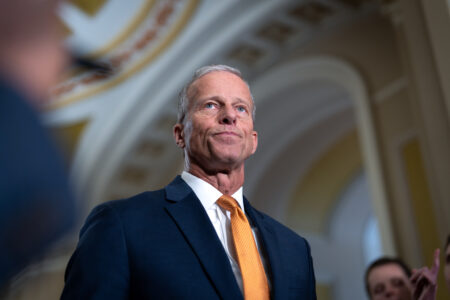West Virginia House closes session with much debate
- House Speaker Roger Hanshaw, R-Clay, took to the floor Saturday to encourage his colleagues to support SB 250, the budget bill. (Photo courtesy of W.Va. Legislative Photography)
- Delegate Lisa Zukoff, D-Marshall, urged her colleagues Saturday to support an amendment to include exemptions for rape and incest in a bill dealing with banning abortions if the reason is because of a detected intellectual disability. (Photo courtesy of WV Legislative Photography)

House Speaker Roger Hanshaw, R-Clay, took to the floor Saturday to encourage his colleagues to support SB 250, the budget bill. (Photo courtesy of W.Va. Legislative Photography)
CHARLESTON – The gavel came down at midnight Saturday, bringing the second session of the 85th Legislature to a close for the year with the West Virginia House of Delegates engaging in lengthy debates that slowed things down.
The House began the day Saturday debating Senate Bill 250, the budget bill for fiscal year 2023 beginning in July. The bill passed in a 90-9 vote after more than two hours of debate, with nine Republicans voting no.
The Senate adopted a compromise amendment Thursday between the Senate’s position, the House’s position in House Bill 4023 and a letter from Gov. Jim Justice sent to the Legislature Thursday making adjustments to the budget he introduced at the beginning of the session.
The compromise amendment to SB 250 sets the general revenue budget for fiscal year 2023 beginning in July at more than $4.635 billion, a $10 million decrease from the governor’s recommended budget and the two budgets passed by the House and Senate.
House Finance Committee Chairman Eric Householder, R-Berkeley, said the compromise included House priorities, such as additional pay raises for the West Virginia State Police, a plan by the governor to increase pay for Child Protection Service employees that was included previously in HoB 4344, the foster care bill and a freeze in regional jail per diem fees.

Delegate Lisa Zukoff, D-Marshall, urged her colleagues Saturday to support an amendment to include exemptions for rape and incest in a bill dealing with banning abortions if the reason is because of a detected intellectual disability. (Photo courtesy of WV Legislative Photography)
“This House actually had three big wins,” Householder said. “The Senate took our position with the trooper pay raise, the CPS pay raise and the per diem freeze. … We heard testimony from (the Department of Health and Human Resources) that they have 1,400 vacant positions that we’re funding them for. (The) governor in his adjustment letter is recommending they be collapsed, and that is how we’re going to pay for the additional pay raise for CPS.”
The budget already includes a 5% average pay increase for state employees paid from the general revenue fund. A separate bill raised teacher and school service personnel salaries along with the additional $10,000 for troopers and certain State Police employees.
“We’re going to get our State Police a 10% pay raise,” said Delegate John Hardy, R-Berkeley.
The compromise includes 18 items in the back of the bill that would be funded with available surplus tax revenue at the end of the current fiscal year, ranked in order of priority. The surplus appropriations total $1.058 billion. The budget also includes more than $1 billion in spending authority across state agencies using available federal COVID-19 funds.
Some House members raised concerns about claims of passing a flat budget despite the surplus and COVID funding.
“This is a $5.6 billion dollar budget,” Delegate Marty Gearheart, R-Mercer. “We haven’t had a budget scrambled like this before. … The reality is we have not critically looked at this budget.”
“I’d like to say ‘ditto,'” said Delegate Lisa Zukoff, D-Marshall. “I have a lot of concerns, especially with the changes that were made so quickly.”
House Speaker Roger Hanshaw, R-Clay, was delayed arriving from his home to Charleston due to a tractor trailer accident on Interstate 79 during Saturday morning’s snowfall, leaving House Speaker Pro Tempore Gary Howell, R-Mineral, presiding over Saturday’s debate on SB 250. Taking the floor, Hanshaw encouraged members to support the budget bill.
“I will absolutely support the motion today. Not because I think everything in it is correct. Not because I even like everything in it. But because … I think the good in it outweighs the bad,” Hanshaw said.
The House had 23 bills on its third-reading agenda Saturday before the clock chimed midnight. Debate broke out over SB 468, the Unborn Child with Down Syndrome Protection and Education Act. The bill passed 81-17.
The bill would prohibit abortions because of physical and intellectual disabilities unless the physician can confirm that is not the primary reason. The bill includes fines for physicians who intentionally and knowingly violate the law.
“I am passionately supportive of this piece of legislation because I believe that every life has value regardless of its diagnosis, regardless of its place, regardless of its locations, regardless of its level of development,” said Delegate Kayla Kessinger, R-Fayette. “Every life in this womb, in the mothers’ wombs, regardless of where it is, was created in God’s image by the same God in whose image you and I were created in.”
Exemptions include the instance of a medical emergency or if the fetus has a severe fetal condition. Multiple efforts to amend the bill by the Democratic caucus, including exemptions for rape and incest offered by Zukoff, failed.
“We’re going to make this child have a child with Down Syndrome or a disability that she’s never going to be able to take care of,” Zukoff said. “I just feel this is cruel; it’s inhumane to be forced to go into this situation when you had a traumatic experience in being forced to have sex against your will.”
Steven Allen Adams can be reached at sadams@newsandsentinel.com.








